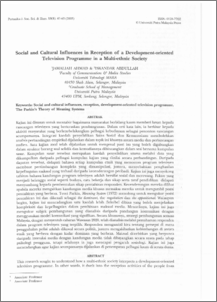Citation
Ahmad, Jamaliah and Abdullah, Iskandar
(2005)
Social and cultural influences in reception of a development-oriented television programme in a multi-ethnic society.
Pertanika Journal of Social Sciences & Humanities, 13 (1).
pp. 47-65.
ISSN 0128-7702; ESSN: 2231-8534
Abstract
This research sought to understand how a multi-ethnic society interprets a development-oriented television programme. In other words, it dwelt into the reception activities of the people from various cultural backgrounds as they watched such a programme. The integration of the Social Sciences method of inquiry and the Humanities enabled a comparative empirical analysis to be carried out on this topic specifically between the media and the audience discourses. A preliminary study was first conducted with a purpose of identifying issues that were to be incorporated into the structured questionnaire which were later used in the focus group sessions. The focus group
was the main method of inquiry through which data were collected from various study groups and comparatively assessed. From the findings we found that different ethnic groups made sense of the television programme in a complex and manipulated way, thus, resulting in the production
of various meanings that reflect their personal invested interests. The study also supported that interpretations of television programme content were social and discursive. The socially bounded factors of the respondents such as their cultures, working style and attitude and educational level were found to have contributed to the shaping of the respective decoding behaviours. Their predispositions came into play as they relate to the particular media contents forcing them to take different decoding positions. The Parkin's Theory of Meaning Systems (1972) help to measure
these decoding positions and described them as the dominant, the negotiation and the oppositional. However, this study suggested that a more flexi measure if developed could account for complexity and multi-variability in meaning making of media messages. Interestingly, this study also indicated that the subject of development could also be analyzed from the communication viewpoint using
the significant communication models. In particular, the present Malaysian development strategies, with special reference to the challenges of Vision 2020, were analyzed through the interpretation of the respondents on the selected television programme. The respondents were very concerned about the perception that the development policies were politically-bound, thus causing certain
level of anxiety among the different ethnic groups with different dominant level. Meanings produced as a result of interactions with media contents are not conceived merely at the psychological level of the users but often reaching the realm of the sociological influences too. The study suggested that a similar research be conducted in other multi-ethnic societies in other parts of the world.
Download File
![[img]](http://psasir.upm.edu.my/style/images/fileicons/application_pdf.png)  Preview |
|
PDF
Social_and_Cultural_Influences_in_Reception_of_a_Development-oriented.pdf
Download (7MB)
|
|
Additional Metadata
Actions (login required)
 |
View Item |

